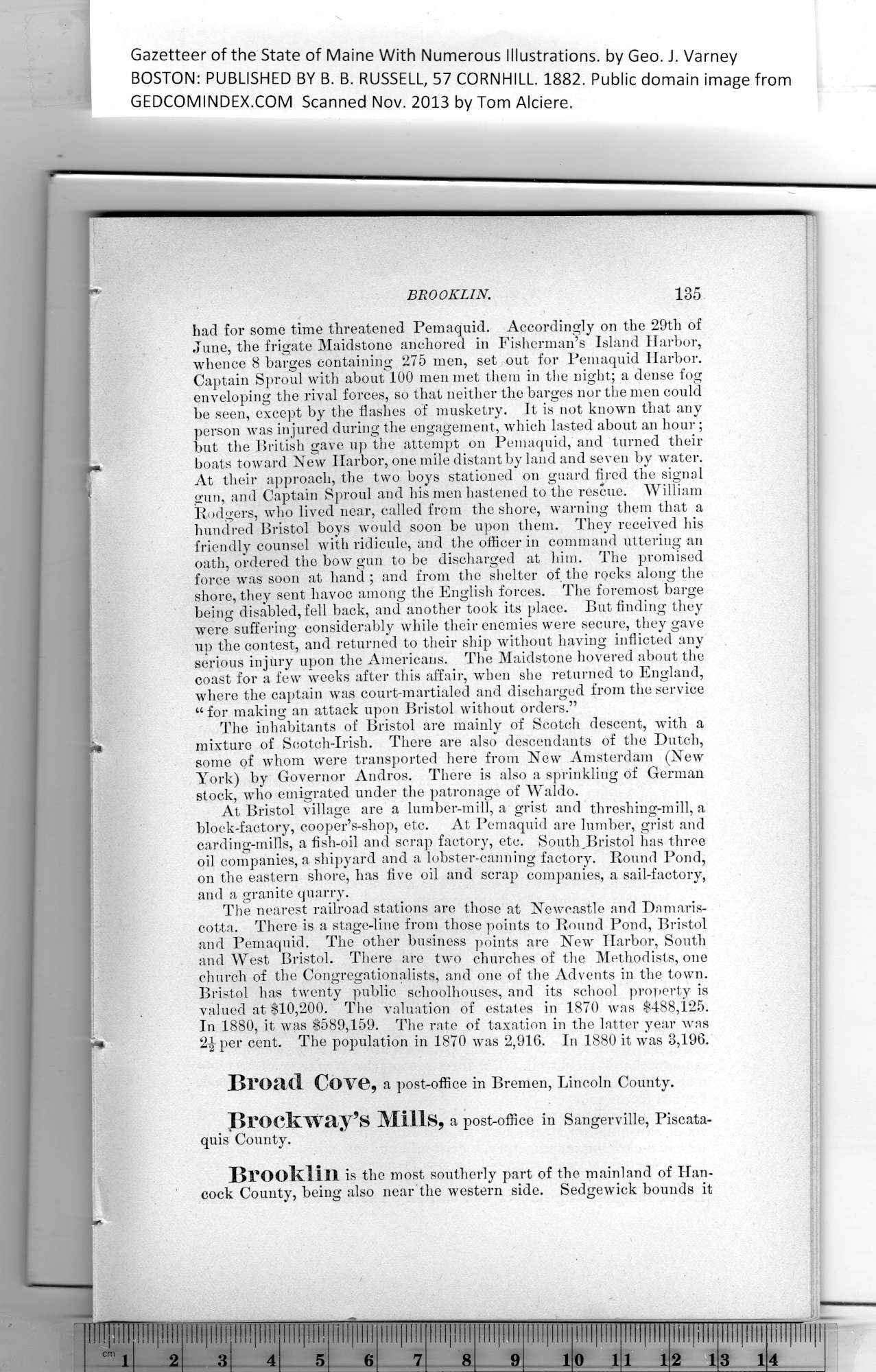|
Gazetteer of the State of Maine With Numerous Illustrations, by Geo. J. Varney
BOSTON: PUBLISHED BY B. B. RUSSELL, 57 CORNHILL. 1882. Public domain image from
BROOKLIN. 135
had for some time threatened Pemaquid. Accordingly on the 29th of
June, the frigate Maidstone anchored in Fisherman’s Island Harbor,
whence 8 barges containing 275 men, set out for Pemaquid Harbor.
Captain Sproul with about 100 men met them in the night; a dense fog
enveloping the rival forces, so that neither the barges nor the men could
be seen, except by the flashes of musketry. It is not known that any
person was injured during the engagement, which lasted about an hour ;
hut the British gave up the attempt on Pemaquid, and turned their
boats toward New Harbor, one mile distant by land and seven by water.
At their approach, the two boys stationed on guard fired the signal
gun, and Captain Sproul and his men hastened to the rescue. William
Rodgers, who lived near, called from the shore, warning them that a
hundred Bristol boys would soon be upon them. They received his
friendly counsel with ridicule, and the officer in command uttering an
oath, ordered the bow gun to be discharged at him. The promised
force was soon at hand ; and from the shelter of the rocks along the
shore, they sent havoc among the English forces. The foremost barge
being disabled, fell back, and another took its place. But finding they
were suffering considerably while their enemies were secure, they gave
up the contest, and returned to their ship without having inflicted any
serious injury upon the Americans. The Maidstone hovered about the
coast for a few weeks after this affair, when she returned to England,
where the captain was court-martialed and discharged from the service
“ for making an attack upon Bristol without orders.”
The inhabitants of Bristol are mainly of Scotch descent, with a
mixture of Scotch-Irish. There are also descendants of the Dutch,
some of whom were transported here from New Amsterdam (New
York) by Governor Andros. There is also a sprinkling of German
stock, who emigrated under the patronage of Waldo.
At Bristol village are a lumber-mill, a grist and threshing-mill, a
block-factory, cooper’s-shop, etc. At Pemaquid are lumber, grist and
carding-mills, a fish-oil and scrap factory, etc. South.Bristol has three
oil companies, a shipyard and a lobster-canning factory. Round Pond,
on the eastern shore, has five oil and scrap companies, a sail-factory,
and a granite quarry.
The nearest railroad stations are those at Newcastle and Damaris-
cotta. There is a stage-line from those points to Round Pond, Bristol
and Pemaquid. The other business points are New Harbor, South
and West Bristol. There are two churches of the Methodists, one
church of the Congregationalists, and one of the Advents in the town.
Bristol has twenty public schoolhouses, and its school property is
valued at $10,200. The valuation of estates in 1870 was $488,i25.
In 1880, it was $589,159. The rate of taxation in the latter year was
2^-per cent. The population in 1870 was 2,916. In 1880 it was 3,196.
Broad Cove, a post-office in Bremen, Lincoln County.
Brockway’s Mills, a post-office in Sangerville, Piscata-
quis County.
Brooklin is the most southerly part of the mainland of Han-
cock County, being also near the western side. Sedgewick bounds it
PREVIOUS PAGE ... NEXT PAGE
This page was written in HTML using a program written in Python 3.2
|
